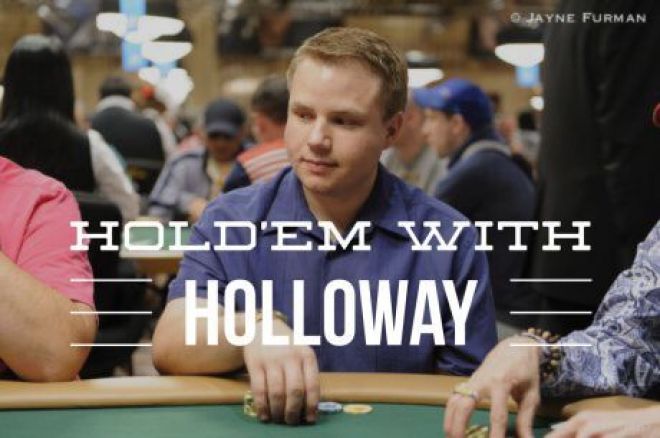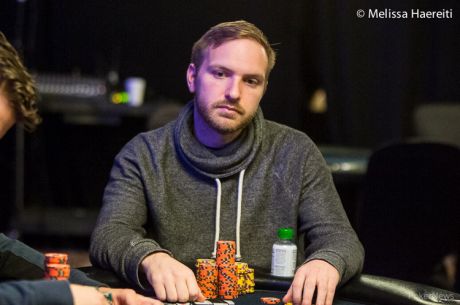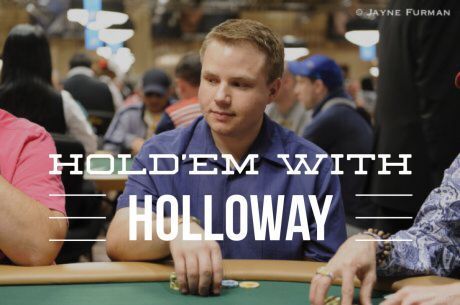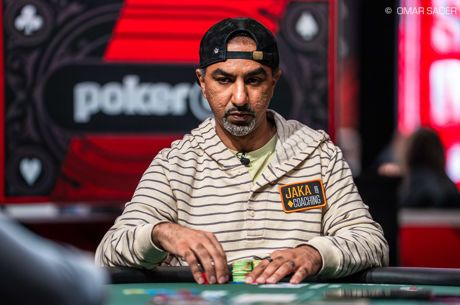Hold��em with Holloway, Vol. 7: 15 Things About Poker I Wish I��d Known Sooner

I recently came across a blog post by Nathan ��BlackRain79�� Williams titled ��47 Things That I Wish Someone Had Told Me Before I Started Playing Poker.�� I��ve always admired Williams ever since I read and reviewed his book Crushing the Microstakes, and this particular blog post struck me as useful to every poker player.
Granted, the post was geared toward online players, but I still took a lot away from it. For my latest Hold��em with Holloway article, I wanted to take a page from Williams and offer some things I wish someone had told me before I started to play live poker.
Williams�� post, which you can read by clicking here, offered 47 tips, but I decided to limit mine to just 15.
Here they are in no particular order:
- Don��t Let Poker Become Your Identity. Over time the ebbs and flows of poker can become intertwined with our personalities; in fact, it seems inevitable for most players. When we win we are happy, when we lose we are miserable. I��ve been there and done that, and believe me when I say it��s not fun. The key is to keep poker a part of your life, but don��t let it become your life.
- Pay Attention to Rewards Programs. Most casinos offer rewards cards, and you can get a lot of value from them. My local casino offers a $1 comp for every hour you play, and those comps can be redeemed for food, hotel rooms, or other items. Plus they give regulars a lot in slot freeplay. Wherever you play, look into it and take advantage.
- Utilize the Call-In List. Did you know most poker rooms will let you call in and put your name on their cash game list an hour or two in advance? That way when you show up you��re near the top �� or at least you have a two-hour head start on those who just show up. I went a good year before I knew about this.
- Preregister for Tournaments. Major tournaments experience an influx of players right around start time. This is especially true at the World Series of Poker. To avoid long lines, register for the event the night before or sooner. That way you can just show up and play.
- Watch the Overhead. Traveling for poker tournaments can be expensive. Transportation, food, and accommodations are just a few of the expenses you��ll incur. There are a few tricks in helping cut down on expenses such as rooming with other players or carpooling. Learn the tricks and you��ll save a fortune in the long run.
- Recognize the Fish are Going to Win. There are few things that tilt me faster than a bad player who gets the best of me. When I first started playing I was under the impression the best player should always win, but that��s not the case. The fish will win from time to time. Recognize it, accept it, and move on to the next hand to try to hook them again.
- Don��t Educate the Fish. Along those same lines, don��t tell the fish why they play so bad. All you��re doing is giving them an opportunity to learn from their mistakes. So what if they cracked your aces by calling off preflop with king-ten offsuit? You want them to do that every time, so don��t explain to them why it was bad. Let them figure it out on their own.
- Track Your Sessions. I won a lot of money playing cash games from 2007-2010, but I can��t tell you exactly how much because I didn��t track it. In order to be a successful player, you need to keep stats such as wins/losses, time played, tournament finishes, and the like. You can either do this with pen and paper or by investing a few bucks in one of the many apps out there designed to help you keep track.
- Watch What You Eat. Before I started playing poker seriously I managed to lose 113 lbs. Over the next seven years I put a lot of it back on sitting at the poker tables. That��s because I would eat unhealthy food while sitting still for hours on end. Fortunately there��s been a health movement in the game in recent years, and I��m a firm believer that a healthy lifestyle only benefits your game.
- The Tight Player is Never Bluffing. I��ve played with a few players over the years whom I��ve never seen bluff. Still, whenever they bet into or raise me I can��t help but think this is the time they��re finally bluffing. Believe me, I��ve made many calls only to discover that indeed they have the goods. Just fold and assume they had it like they always do. If they didn��t, you��ll never know and good for them.
- Poker Isn��t a Contest of Egos. There will inevitably be a player or two at the table who wants everyone to know that they��re the best; in fact, I��ve been that player. What I��ve learned is it doesn��t matter. Those who win in the long run are those who stay out of the limelight and crosshairs while focusing on their game.
- Become Part of the Poker Community. No matter where you play I guarantee there is a poker-playing community of some kind. Getting in can be as simple as getting to know the regulars in your game. For me, there is a dedicated Facebook group for Wisconsin players that allow us to share strategies, arrange for poker trips, and promote games, among other things. It��s proven tremendously useful.
- Don��t Be Afraid to Say No. Poker rooms can be full of peer pressure. From those who want a round of straddles to those who��re looking for a chop, you��re bound to feel compelled to do something you may not want to do. Don��t be afraid to say no. They��ll try to make you out as the bad guy, but don��t take it to heart. Instead use the information you just gained (e.g., start targeting those who wanted to chop and are desperate to move up the payouts) to your advantage.
- Continue to Study. There��s no denying poker has gotten tougher. In 2006 there were seven or eight bad players for every capable one. The opposite is true today. The game has evolved, and those who have success are those who adapt and evolve with it. For years I relied on my same old tricks, and I was getting crushed. A couple years ago I made an effort to consume poker books, training sites, and strategy articles, and my game quickly improved; in fact, I managed to win a World Series of Poker gold bracelet in 2013.
- Beware of the Vultures. If you��re fortunate to notch a big tournament score, know that people will come out of the woodwork. I only won $84,915 for my bracelet win, but even so I had people �� some I didn't know and others I hadn't talked to in years �� message me on Facebook, text me, and approach me in person asking for money. Each of them had a sob story, and while it was neither easy nor pleasurable to say no, I had to shoo away the vultures. Be careful who you trust and take care of yourself.
I know there are a lot of ��tips�� I��m overlooking. What do you wish someone had told you before you started playing poker? Let me know on Twitter @ChadAHolloway.
Get all the latest PokerNews updates on your social media outlets. Follow us on Twitter and find us on both Facebook and Google+!
In this Series
- 1 Hold��em with Holloway, Vol. 1: Making Reads and Trusting Them
- 2 Hold��em with Holloway, Vol. 2: Playing in Poker Charity Events
- 3 Hold��em with Holloway, Vol. 3: Throttle Back Before You End Up Punting
- 4 Hold��em with Holloway, Vol. 4: Punish the Satellite Bubble
- 5 Hold��em with Holloway, Vol. 5: What is Proper Accumulator Strategy?
- 6 Hold��em with Holloway, Vol. 6: A Chip and a Chair Story with ��SirWatts��
- 7 Hold��em with Holloway, Vol. 7: 15 Things About Poker I Wish I��d Known Sooner
- 8 Hold��em with Holloway, Vol. 8: Examining the Largest Overlay in Poker History
- 9 Hold��em with Holloway, Vol. 9: Differences Between Rebuys and Reentries
- 10 Hold��em with Holloway, Vol. 10: Five Must-Read Poker Books of 2014
- 11 Hold��em with Holloway, Vol. 11: When Will You Finally Break Through?
- 12 Hold��em with Holloway, Vol. 12: Dealing with a Target on Your Back
- 13 Hold��em with Holloway, Vol. 13: Knowing When to Call It Quits
- 14 Hold��em with Holloway, Vol. 14: Embarking on a Year-Long Weight Loss Journey
- 15 Hold��em with Holloway, Vol. 15: Navigating Multiple Decision Points in a Poker Hand
- 16 Hold��em with Holloway, Vol. 16: Chris Moorman Tells Me How Badly I Play Poker
- 17 Hold��em with Holloway, Vol. 17: Richard ��nutsinho�� Lyndaker on Getting It in Marginal
- 18 Hold��em with Holloway, Vol. 18: Getting Inside the Head of Poker Pro Brian Rast
- 19 Hold��em with Holloway, Vol. 19: Stupid Calls & Lucky Draws in MSPT WI Championship
- 20 Hold��em with Holloway, Vol. 20: Talking Ante-Only Strategy with Greg ��FossilMan�� Raymer
- 21 Hold��em with Holloway, Vol. 21: Contributing to Jonathan Little��s New Book
- 22 Hold��em with Holloway, Vol. 22: Consequences of Acting Out of Turn & Tossing in Chips
- 23 Hold��em with Holloway, Vol. 23: When It Comes to Chops, Do What��s In Your Best Interest
- 24 Hold��em with Holloway, Vol. 24: Accepting Bad Beats & Lessons in Selling Action
- 25 Hold��em with Holloway, Vol. 25: Heinz�� Ace-High Call Shows Why He's a World Champ
- 26 Hold��em with Holloway, Vol. 26: Is Keeping the Short Stack Alive Collusion?
- 27 Hold��em with Holloway, Vol. 27: Great Laydown or Bad Fold on Poker Night in America?
- 28 Hold��em with Holloway, Vol. 28: Calling Hellmuth with Jack-Deuce Offsuit
- 29 Hold��em with Holloway, Vol. 29: The Philosophy of "No-Chop" Chad
- 30 Hold��em with Holloway, Vol. 30: Preparing to Play the World Series of Poker
- 31 Hold��em with Holloway, Vol. 31: Staying on Your Grind at the World Series of Poker
- 32 Hold��em with Holloway, Vol. 32: The Perilous Decision to Call Off with Ace-Queen
- 33 Hold��em with Holloway, Vol. 33: Using Poker Skills in Reality TV Competitions
- 34 Hold��em with Holloway, Vol. 34: Esfandiari Explains How to Recover from Bad Beats
- 35 Hold��em with Holloway, Vol. 35: Tilly vs. Brunson in Super High Roller Cash Game Hand
- 36 Hold��em with Holloway, Vol 36: Unconventional Play Leads to Good WSOP Main Event Start
- 37 Hold��em with Holloway, Vol. 37: Lessons in Pot-Limit Omaha Hi-Low w/ Evan Jarvis
- 38 Hold��em with Holloway, Vol. 38: Things to Say and Do When You Bust a Poker Tournament
- 39 Hold��em with Holloway, Vol. 39: How Much Did I Have to Raise to Get You to Fold?
- 40 Hold��em with Holloway, Vol. 40: Practicing Patience in My Deep PPC Poker Tour Run
- 41 Hold��em with Holloway, Vol. 41: Analyzing a Questionable SHRPO Main Event Hand
- 42 Hold��em with Holloway, Vol. 42: Analyzing the Play of Neymar Jr. at EPT Barcelona
- 43 Hold��em with Holloway, Vol. 43: The Value of a Reliable Poker Reputation
- 44 Hold��em with Holloway, Vol. 44: John ��KasinoKrime�� Beauprez Rips My PLO Game Apart
- 45 Hold��em with Holloway, Vol. 45: Satellite Dilemmas -- To Call or Not to Call
- 46 Hold��em with Holloway, Vol. 46: Seiver Leverages the River in Super High Roller Bowl
- 47 Hold��em with Holloway, Vol. 47: What Untraditional Moves in Poker Might Mean
- 48 Hold��em with Holloway, Vol. 48: Thinking About the Future with Sam Grizzle
- 49 Hold��em with Holloway, Vol. 49: WCOOP Champ ��Coenaldinho7�� Offers Up His Biggest Hands
- 50 Hold��em with Holloway, Vol. 50: The Peril of Shoving Weak Aces
- 51 Hold��em with Holloway, Vol. 51: The Importance of Not Giving Up in Poker Tournaments
- 52 Hold��em with Holloway, Vol. 52: Does Asking ��Check�� Actually Constitute a Check?
- 53 Hold��em with Holloway, Vol. 53: Thomas Cannuli Impresses Even After Main Event Bustout
- 54 Hold��em with Holloway, Vol. 54: Dealers Aren��t Always Right
- 55 Hold��em with Holloway, Vol. 55: Don��t Get Married to Pocket Aces
- 56 Hold��em with Holloway, Vol. 56: Bazeley��s Survival Instinct Leads to Continued Success
- 57 Hold��em with Holloway, Vol. 57: Playing ��Deuces Wild�� on the European Poker Tour
- 58 Hold��em with Holloway, Vol. 58: The Wildest Hand in European Poker Tour History
- 59 Hold��em with Holloway, Vol. 59: Death, Zombies & Spending Time w/Phil Hellmuth
- 60 Hold��em with Holloway, Vol. 60: How the Unstoppable Fedor Holz Managed to Win Again
- 61 Hold��em with Holloway, Vol. 61: Lessons To Be Learned When You Hit the Big Stage
- 62 Hold��em with Holloway, Vol. 62: Steve O��Dwyer Explains the ��Oreo Cookie Tell��
- 63 Hold��em with Holloway, Vol. 63: What Would Happen to a Chip Stack If a November Niner Died?
- 64 Hold��em with Holloway, Vol. 64: Forgetting One Chip -- Should It Still Be an All-In Bet?
- 65 Hold��em with Holloway, Vol. 65: Todd ��sharkslayerrr�� Breyfogle on Bankroll Management
- 66 Hold��em with Holloway, Vol. 66: Cash Game Pro Daniel Arfin Offers Sound Bankroll Advice
- 67 Hold��em with Holloway, Vol. 67: Honeyman Plays Kings to Keep in Opponent��s Bluff Range
- 68 Hold��em with Holloway, Vol. 68: Why Do I Even Bother Drinking at the Poker Table?
- 69 Hold��em with Holloway, Vol. 69: Is Your Favorite Poker Pro Left- or Right-Handed?
- 70 Hold��em with Holloway, Vol. 70: In Order to Live You Have to Be Willing to Die
- 71 Hold��em with Holloway, Vol. 71: How to Amass a Big Stack Early in a Poker Tournament
- 72 Hold��em with Holloway, Vol. 72: Answering User-Submitted Poker Scenarios
- 73 Hold��em with Holloway, Vol. 73: Saying Goodbye with a Top Five List
- 74 Hold'em with Holloway, Vol. 74: We're Back, Baby!
- 75 Hold'em with Holloway, Vol. 75: Jivkov on Exploiting Capped Ranges
- 76 Hold��em with Holloway, Vol. 76: Matt Bretzfield Gets Tricky With Aces
- 77 Hold'em with Holloway, Vol. 77: Joseph Cheong Gets Crazy with a Pair of Ladies
- 78 Hold'em with Holloway, Vol. 78: Wyoming Poker Action & Wild South Dakota Hand
- 79 Hold'em with Holloway, Vol. 79: Calling Controversy at WinStar
- 80 Hold'em with Holloway, Vol. 80: Going for Value with Matt Hunt
- 81 Hold'em with Holloway, Vol. 81: Bracelet Winner Ryan Leng on Bad Call
- 82 Hold'em with Holloway, Vol. 82: Romeopro33 Recounts XL Eclipse Victory
- 83 Hold'em with Holloway, Vol. 83: Men The Master Doesn't Get Paid
- 84 Hold'em with Holloway, Vol. 84: Harman Hits Back-to-Back Miracle Turns
- 85 Hold'em with Holloway, Vol. 85: Jamie Kerstetter on Dealing with Bounties
- 86 Hold'em with Holloway, Vol. 86: Matt Stout Develops a Limp Dynamic
- 87 Hold'em with Holloway, Vol. 87: Matt Alexander Caught in Between w/ Two Red Aces
- 88 Hold'em with Holloway, Vol. 88: John Beauprez on Why He Folded a Set of Jacks
- 89 Hold'em with Holloway, Vol. 89: Alex Aqel Lets Opponent Hang Himself with Aces
- 90 Hold'em with Holloway, Vol. 90: David Peters Makes Beastly Call Against Will Givens
- 91 Hold'em with Holloway, Vol. 91: Poker Lessons from a Game of Risk
- 92 Hold'em with Holloway, Vol. 92: My Upstuck Diagnosis by the CLC Squad
- 93 Hold'em with Holloway, Vol. 93: Alex Foxen Coolers Nick Petrangelo in SHRB
- 94 Hold'em with Holloway, Vol. 94: My $25,000 PSPC Experience at 2019 PCA
- 95 Hold'em with Holloway, Vol. 95: The Equity of Leveraging Time Extensions
- 96 Hold'em with Holloway, Vol. 96: Dan O'Brien on Developing Healthy Routines
- 97 Hold'em with Holloway, Vol. 97: Big Hands From the WSOP-C Potawatomi
- 98 Hold'em with Holloway, Vol. 98: Simon Deadman Rips Apart My NLH Tourney Play
- 99 Hold'em with Holloway, Vol. 99: Shoving 10-6 Smack Dab Into Pocket Aces
- 100 Hold'em with Holloway, Vol. 100: The Revived Re-Entries Debate








